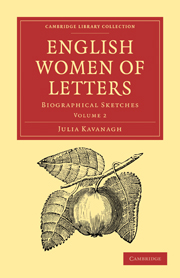Summary
The great Doctor Johnson once made a curious acknowledgment to Mrs. Thrale. He confessed to her that the progress made of late years in literature by women amazed him; and he added “that he well remembered the time when a woman who could spell a common letter was regarded as all-accomplished, but now they vied with the men in everything.” Of these Mrs. Inchbald did not care to be. She wrote plays and novels, but she held her sex a sufficient excuse for any literary deficiencies. She enjoyed severe criticism, and did not object being subject to it. “Perhaps I should if I were a man,” she added, “but for a woman to expose the want of literary talent I conceive no reproach, provided she is not led to publish merely through self-conceit.”
Necessity being her motive, Mrs. Inchbald held herself free from blame. Her writings justify this theory. They display wonderful talent, more than talent, genius, and great ignorance, great want of the delicate refinement which is the offspring of a cultivated mind. Of all the women who wrote, Mrs. Inchbald seems to us the least literary, in the good and honourable sense of the word. We miss the graces of style, of thought, of imagery, which are some of the charms of all writing. Yet it may be that these very deficiencies have added to her power, have given her concentration and force. Her pathos is still irresistible, and that is a great test.
- Type
- Chapter
- Information
- English Women of LettersBiographical Sketches, pp. 45 - 85Publisher: Cambridge University PressPrint publication year: 2010First published in: 1863

